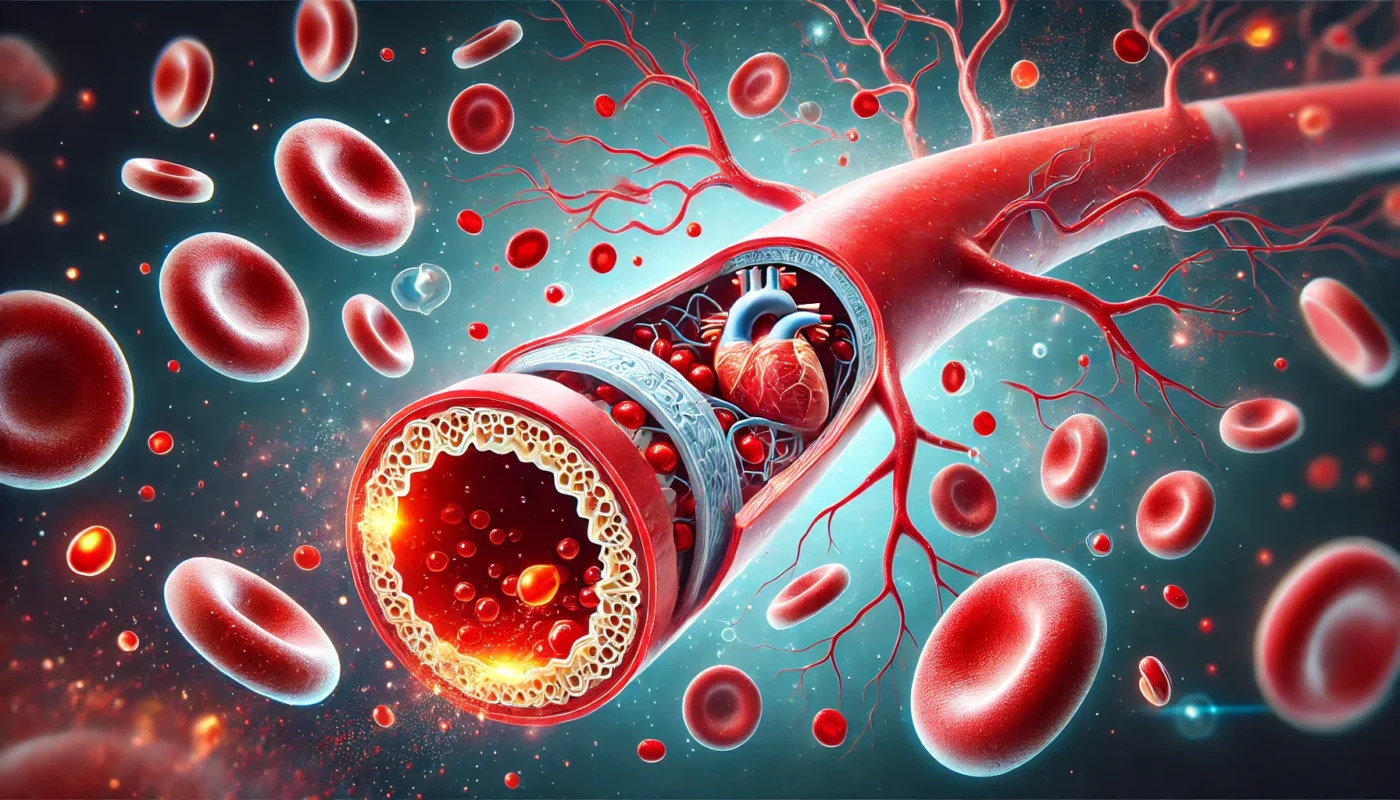Cholesterol and inflammation are two terms often mentioned in health discussions. They are both crucial to our body’s functioning, yet they can also contribute to various health issues when out of balance.
Understanding the link between cholesterol and inflammation is essential. It can help us make informed decisions about our health and wellness. This article aims to shed light on this complex relationship.
Cholesterol, often misunderstood, plays a vital role in our bodies. It’s involved in hormone production and cell membrane structure. However, when levels are too high, it can lead to health problems.
Inflammation, on the other hand, is part of our body’s defense mechanism. It helps protect us from injury and infection. But when it becomes chronic, it can trigger a host of health issues.
The connection between cholesterol and inflammation is a topic of ongoing research. Some studies suggest that inflammation can lead to changes in cholesterol levels and vice versa.
This article will delve into the science behind this link. It will also provide practical advice on managing cholesterol and inflammation through diet, exercise, and lifestyle changes.
Whether you’re a fitness enthusiast, a health enthusiast, or a medical patient, this comprehensive guide will help you navigate the complex world of cholesterol and inflammation. Let’s embark on this journey to better health together.
You May Also Like: Inflammatory Diseases: Causes and Treatments Explained
Cholesterol Explained: Types and Functions
Cholesterol is a waxy, fat-like substance found in every cell of the body. It’s vital for producing hormones, vitamin D, and substances that help digest foods.
Cholesterol travels through the bloodstream on proteins called lipoproteins. These lipoproteins come in different types, primarily LDL and HDL.
LDL stands for low-density lipoprotein, often labeled as “bad” cholesterol. When LDL levels are high, they can accumulate in the walls of blood vessels.
This buildup can lead to atherosclerosis, a condition that narrows and hardens the arteries. It’s a major risk factor for heart disease and stroke.
Conversely, HDL, or high-density lipoprotein, is known as “good” cholesterol. HDL helps remove cholesterol from the bloodstream by transporting it back to the liver.
The liver processes and eliminates it from the body, thus reducing the risk of plaque formation in arteries. Maintaining a balance between LDL and HDL is crucial for heart health.
The body’s cholesterol can come from dietary sources like meat, poultry, and dairy products. However, the body also produces it naturally in the liver.
To summarize, here are the main types and their functions:
- LDL (Low-Density Lipoprotein): Transports cholesterol to cells, but excess can cause artery blockage.
- HDL (High-Density Lipoprotein): Carries cholesterol away from the arteries and back to the liver for disposal.
Understanding these types and their roles helps us better comprehend the importance of managing cholesterol levels. This knowledge empowers individuals to make informed dietary and lifestyle choices.
Misconceptions About Cholesterol
Cholesterol often gets a bad rap, largely due to misunderstandings about its role. One common misconception is that all cholesterol is harmful.
This belief overlooks the crucial functions cholesterol performs, such as hormone and vitamin D production. The body needs cholesterol to function optimally.
Another myth is that dietary cholesterol directly raises blood cholesterol levels. Current research shows that this link is not as straightforward as once thought.
In many cases, saturated and trans fats in the diet have a more significant impact on blood cholesterol than the cholesterol in food itself.
Many people also believe that reducing cholesterol levels will eliminate their risk of heart disease. While managing cholesterol is crucial, other factors like inflammation, diet, and lifestyle also play significant roles.
Dispelling these misconceptions is essential for a balanced perspective on cholesterol. It helps individuals make informed decisions about their health. Understanding these nuances is key to effective cholesterol management.

Inflammation: The Body’s Response to Injury
Inflammation is a natural response of the immune system. It occurs when your body detects harmful stimuli such as pathogens, damaged cells, or irritants.
This process is essential for healing, characterized by redness, warmth, swelling, and sometimes pain. These are signs that your body’s immune cells are working to repair tissue damage and fight off invaders.
Acute inflammation is short-term, lasting only a few hours or days. It’s a crucial part of healing from injuries or infections.
Factors such as cuts, sprains, or infections can trigger this immediate response. Once the threat is neutralized, inflammation subsides, and the healing process continues.
However, when inflammation lingers, it becomes chronic. It can last for weeks, months, or even years, causing ongoing low-level pain or discomfort.
Chronic inflammation can silently damage tissues and organs. It often occurs when the immune response is not properly regulated or in cases where the body is constantly exposed to harmful substances.
This prolonged inflammation is linked to various diseases, including arthritis, heart disease, and even cancer. It’s essential to manage inflammation effectively for long-term health.
Understanding inflammation’s dual role in health and disease can help individuals better manage their risk factors. Recognizing the signs of both acute and chronic inflammation is the first step toward prevention.
Chronic Inflammation: A Silent Threat
Chronic inflammation can be insidious, often presenting no obvious symptoms for years. Yet, its impact can be profound, silently damaging the body over time.
Unlike acute inflammation, which is protective, chronic inflammation can lead to a state of persistent alert. This can harm tissues rather than heal them.
Common causes include untreated infections, long-term exposure to irritants such as tobacco smoke, and autoimmune disorders. Diet and stress also play crucial roles.
Chronic inflammation is a known contributor to many serious diseases. Cardiovascular diseases, diabetes, and neurodegenerative disorders are often linked to it.
Being proactive about reducing inflammation can significantly improve quality of life. This includes adopting anti-inflammatory diets, managing stress, and staying active.
Incorporating these lifestyle changes can help manage and mitigate the long-term risks associated with chronic inflammation. Understanding its silent nature and taking preventive actions is key to maintaining health.
The Science Behind Cholesterol and Inflammation
The link between cholesterol and inflammation is a critical aspect of cardiovascular health. Scientific research offers insights into this complex relationship.
Cholesterol is essential for the body, involved in building cells and producing hormones. However, when levels become unbalanced, it poses significant health risks.
There are two main types of cholesterol: low-density lipoprotein (LDL) and high-density lipoprotein (HDL). LDL is often termed “bad” cholesterol as high levels can lead to artery blockages.
HDL, known as “good” cholesterol, helps transport cholesterol to the liver for removal. It plays a role in protecting against heart disease.
Inflammation can influence cholesterol levels in several ways. Acute inflammation might temporarily increase cholesterol as the body copes with injury or infection.
However, chronic inflammation leads to persistent cholesterol elevation, promoting plaque buildup in arteries. This can increase the risk of cardiovascular diseases.
Research has shown that LDL particles can become oxidized, triggering an inflammatory response within arterial walls. This response can result in atherosclerosis.
Inflammation’s role in altering cholesterol levels reflects the body’s interconnected systems. It’s a dynamic process that can change cholesterol’s impact on health.
As chronic inflammation continues unchecked, it can cause further complications. It exacerbates cholesterol’s harmful effects, elevating cardiovascular disease risk.
Understanding the interplay between inflammation and cholesterol is essential for developing effective intervention strategies. Managing both factors is crucial for heart health.
Key Points:
- Inflammation can alter cholesterol levels.
- LDL oxidation leads to arterial inflammation.
- HDL plays a protective, anti-inflammatory role.
By combining these insights with healthy lifestyle choices, individuals can better manage their heart health.
How Inflammation Affects Cholesterol Levels
Inflammation plays a pivotal role in modifying cholesterol dynamics. It influences how cholesterol is managed and transported in the body.
During inflammation, the liver produces more cholesterol to fight infections. This can cause temporary cholesterol level increases.
Chronic inflammation poses different challenges. It often leads to higher LDL levels, contributing to artery plaque development.
This inflammatory state also reduces HDL effectiveness. It hinders HDL’s ability to remove excess cholesterol from the bloodstream.
These changes create conditions conducive to cardiovascular diseases. Proactively managing inflammation can mitigate these risks significantly.
The Inflammation Hypothesis of Atherosclerosis
The inflammation hypothesis posits that inflammation is a key driver of atherosclerosis. This chronic condition involves the hardening and narrowing of arteries.
When LDL cholesterol becomes oxidized, it triggers inflammation in the arterial walls. This process attracts immune cells, leading to plaque formation.
As plaques grow, they restrict blood flow and increase the risk of heart attacks. The inflammation within these plaques can destabilize them, leading to rupture.
This hypothesis underscores the role of inflammation beyond cholesterol’s presence. It suggests a dual approach to prevent heart disease by managing both inflammation and cholesterol.
Emerging research supports this hypothesis, offering insights into potential treatments. Anti-inflammatory drugs could become a vital component of cardiovascular disease management.

Diet, Exercise, and Lifestyle: Managing Cholesterol and Inflammation
Effective management of cholesterol and inflammation requires a multifaceted approach. Diet, exercise, and lifestyle play crucial roles in this process.
Eating a balanced diet rich in whole foods can support cholesterol management and reduce inflammation. Emphasizing nutrients that promote heart health is key.
Incorporate foods high in fiber, such as fruits and vegetables, to assist in lowering LDL cholesterol. Fiber helps decrease cholesterol absorption in the bloodstream.
Choose healthy fats like those found in avocados, nuts, and olive oil. These fats can improve HDL cholesterol and offer anti-inflammatory benefits.
Limit consumption of saturated fats and trans fats. These fats can increase LDL cholesterol and trigger inflammation.
Exercise is another critical component. Regular physical activity helps regulate cholesterol and reduces inflammatory markers in the body.
Engaging in both aerobic activities and strength training offers comprehensive benefits for heart health. Include a variety to maintain motivation and effectiveness.
Stress management techniques, like mindfulness meditation, play a role in mitigating inflammation. They lower stress hormones that can negatively impact cholesterol.
Adequate sleep is essential for overall health, including cholesterol and inflammation levels. Lack of sleep can increase stress and hinder cholesterol regulation.
Lifestyle changes take time and commitment. However, they offer powerful means to improve heart health and overall wellbeing.
Anti-Inflammatory Foods and Their Impact on Cholesterol
Certain foods possess anti-inflammatory properties that can positively influence cholesterol levels. These choices promote both heart health and reduced inflammation.
Incorporate these foods into your diet for added benefits:
- Fatty fish: Rich in omega-3 fatty acids, which combat inflammation.
- Berries: Packed with antioxidants, they help reduce inflammatory markers.
- Leafy greens: High in vitamins and anti-inflammatory compounds.
- Nuts and seeds: Provide healthy fats and reduce LDL cholesterol.
- Olive oil: A staple in the Mediterranean diet, known for its heart benefits.
Focus on variety to ensure your body receives a range of nutrients. This diversity supports a balanced approach to managing cholesterol and inflammation.
The Role of Exercise in Reducing Inflammation and Cholesterol
Exercise is a vital tool in lowering cholesterol and managing inflammation. It offers numerous benefits beyond physical fitness alone.
Regular aerobic activities, such as walking or cycling, help increase HDL cholesterol. This effect aids in transporting excess cholesterol to the liver for disposal.
Strength training exercises support muscle health and also improve LDL cholesterol levels. Combined with aerobic activities, they create a robust exercise routine.
Exercise’s impact on inflammation is notable. Physical activity increases the production of anti-inflammatory substances, reducing the inflammatory response.
Find activities you enjoy to maintain consistency and motivation. The cumulative benefits of regular exercise improve cardiovascular health significantly.
Stress, Sleep, and Their Connection to Cholesterol and Inflammation
Stress and sleep are critical factors influencing cholesterol and inflammation. Addressing both can have profound impacts on heart health.
Chronic stress triggers the release of hormones like cortisol, which can increase cholesterol levels. Managing stress is essential for mitigating this effect.
Incorporate stress-reduction techniques into your daily routine. Mindfulness practices and relaxation exercises reduce cortisol and improve mental wellbeing.
Sleep also plays a major role in health management. Insufficient sleep can elevate stress hormones and disrupt cholesterol metabolism.
Aim for consistent sleep patterns and sufficient rest each night. Quality sleep supports both physical recovery and hormonal balance.
Combining stress management and adequate sleep creates a foundation for effective cholesterol and inflammation management, supporting overall health longevity.
Genetic and Environmental Factors
Genetics play a pivotal role in determining cholesterol levels and inflammation susceptibility. Some individuals are genetically predisposed to higher cholesterol or chronic inflammation.
Family history can provide insights into potential hereditary risks. It’s vital to be aware of any familial patterns of heart disease or related conditions.
Environmental factors, such as air pollution and exposure to toxins, also influence inflammation. These factors can exacerbate health risks, including high cholesterol levels.
Lifestyle choices further interact with genetic predispositions. Poor diet and sedentary behavior can enhance genetic risks, leading to increased cholesterol and inflammation.
Balancing genetic and environmental factors requires a comprehensive approach. Identifying personal risk factors and adjusting lifestyle choices are key to effective management.
Medications, Supplements, and Natural Remedies
Medications often play a crucial role in managing cholesterol and inflammation, especially when lifestyle changes aren’t enough. Statins are commonly prescribed to reduce LDL cholesterol.
Other medications, such as anti-inflammatories, target chronic inflammation. They help reduce risk factors for heart disease and other health complications.
Supplements can be beneficial, but they should complement—not replace—conventional treatments. Omega-3 fatty acids, found in fish oil, support heart health.
Plant sterols and stanols are other supplements that help lower cholesterol. These natural compounds block cholesterol absorption in the gut.
- Omega-3s: Reduce inflammation and support cardiovascular health.
- Plant sterols: Lower LDL cholesterol effectively.
- Fiber supplements: Aid in cholesterol management by reducing absorption.
Natural remedies, like consuming turmeric and ginger, boast anti-inflammatory effects. These spices can be incorporated into meals for added benefits.
Caution is essential when using supplements and remedies. Consulting healthcare professionals ensures they’re safe and effective for individual needs.
A balanced approach, combining medications, supplements, and lifestyle adjustments, yields the best outcomes. This holistic strategy aids in managing cholesterol and inflammation effectively.
Practical Tips and Strategies for Everyday Life
Taking charge of your health begins with simple, everyday habits. These strategies can help manage cholesterol and reduce inflammation effectively.
Start by assessing your current lifestyle. Understand what changes might benefit your well-being the most.
Develop a routine that emphasizes healthy eating. Include plenty of fresh fruits, vegetables, whole grains, and lean proteins.
Regular exercise is critical. Aim for at least 30 minutes of moderate activity, like walking or cycling, most days of the week.
- Walking: Boosts cardiovascular health and reduces stress.
- Yoga: Enhances flexibility and lowers inflammation levels.
- Swimming: Provides a whole-body workout without joint stress.
It’s also essential to manage stress. Incorporate relaxation techniques into your daily life, such as deep breathing or meditation.
- Deep Breathing: Calms the nervous system.
- Meditation: Helps control stress and improve focus.
- Journaling: Provides an outlet for emotions and thoughts.
Regular sleep patterns can significantly affect inflammation and cholesterol. Strive for 7-9 hours of quality sleep each night.
Monitor your progress through routine health screenings. Tracking cholesterol levels and inflammatory markers provides valuable insights.
Stay hydrated throughout the day. Proper hydration supports overall body functions and can indirectly influence health markers.
Lastly, educate yourself continuously. Being informed empowers you to make the best choices for your health.
Incorporating Anti-Inflammatory Practices into Your Routine
Adopting anti-inflammatory habits is a proactive step toward better health. Small adjustments can lead to significant improvements.
Begin by adding anti-inflammatory foods to your meals. Think of incorporating berries, leafy greens, and fatty fish regularly.
Consider integrating exercise into your daily schedule. Even light activity can lower inflammation over time.
Practice mindfulness techniques to balance emotional and physical stressors. Mindfulness involves focusing on the present moment without judgment.
- Berries: Packed with antioxidants to combat inflammation.
- Leafy Greens: Rich in essential vitamins and minerals.
- Fatty Fish: High in omega-3 fatty acids that reduce inflammation.
Hydration should not be overlooked. Drinking adequate water helps maintain bodily functions and reduces inflammatory processes.
Commit to these practices consistently. Over time, they can become effortless parts of your routine, enhancing your overall health.

Conclusion: A Holistic Approach to Cholesterol and Inflammation
Taking a comprehensive view of health offers numerous benefits. Considering both cholesterol and inflammation in context is essential.
A holistic approach focuses on lifestyle, diet, and mental well-being. These elements work synergistically to improve health outcomes.
Addressing each aspect individually can lead to better management of both cholesterol and inflammation.
Ultimately, adopting this approach promotes long-term health and resilience.
Further Reading:
Cleveland Clinic: High Cholesterol Diseases
Harvard Health Publishing: New insights about inflammation
National Library of Medicine: Inflammation, not Cholesterol, Is a Cause of Chronic Disease
cholesterol management, inflammation reduction, exercise benefits, stress management, sleep health, genetic factors, dietary supplements, anti-inflammatory foods, holistic health, cardiovascular health, lifestyle changes, wellness strategies
Important Note: The information contained in this article is for general informational purposes only, and should not be construed as health or medical advice, nor is it intended to diagnose, prevent, treat, or cure any disease or health condition. Before embarking on any diet, fitness regimen, or program of nutritional supplementation, it is advisable to consult your healthcare professional in order to determine its safety and probable efficacy in terms of your individual state of health.
Regarding Nutritional Supplements Or Other Non-Prescription Health Products: If any nutritional supplements or other non-prescription health products are mentioned in the foregoing article, any claims or statements made about them have not been evaluated by the U.S. Food and Drug Administration, and such nutritional supplements or other health products are not intended to diagnose, treat, cure, or prevent any disease.

